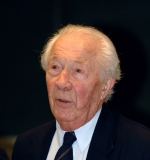 Christian de Duve
Christian de DuveThe eminent biologist Christian de Duve died on May 4, 2013, at the age of 95, according to the de Duve Institute. In 1974, de Duve, Albert Claude, and George E. Palade received the Nobel Prize in Physiology or Medicine "for their discoveries concerning the structural and functional organization of the cell"; de Duve's work on lysosomes and peroxisomes was specifically cited as important. A prolific writer, later in his career he wrote a number of books for the general public, including Vital Dust (Basic Books, 1995), Life Evolving (Oxford University Press, 2002), Singularities (Cambridge University Press, 2005), and Genetics of Original Sin (Yale University Press, 2010).
In 1997, de Duve told the Nobel Foundation, "In the last few years, I have become increasingly interested in the origin and evolution of life." That interest was in display in his popular books; he insisted, in Genetics of Original Sin, "Evolution is no longer a theory, just as heliocentrism is no longer a theory; it is a fact" (p. 11). Unsurprisingly, he was dismissive of creation science and intelligent design. In Singularities, for instance, he wrote, with reference to "intelligent design" (pp. 4-5): "This mechanism postulates the occurrence of evolutionary steps that could not possibly have taken place without the intervention of some kind of supernatural guiding entity. Strictly speaking, such a possibility hardly deserves mention in a scientific context, as it can come into account only after all natural explanations have been ruled out, and, obviously, they never can be. Intelligent design has, however, been advocated in a recent years by a small minority of highly vocal scientists, who claim to have demonstrated that certain evolutionary steps cannot be explained in strictly natural terms. Loudly acclaimed in many fundamentalists and even more liberal religious circles, these arguments have failed to convince a significant number of scientists." De Duve was one of the seventy-eight Nobel laureates in science to endorse the effort to repeal Louisiana's so-called Science Education Act.
De Duve was born in Thames-Ditton, Surrey, outside London, on October 2, 1917; his parents were Belgian nationals who took refuge in England during the First World War. Returning to Belgium, he was educated at the Catholic University of Louvain, where he received a M.D. in 1941 and — after a stint in the Belgian army and then in a prison camp — a graduate degree (the equivalent of a M.S.) in chemistry in 1946. After post-graduate work abroad, he returned to Louvain, where he was a professor until 1985; from 1962 to 1988, he was also a professor at Rockefeller University. Besides the Nobel Prize, his honors included at least sixteen honorary degrees, membership in the National Academy of Sciences, and the E. B. Wilson award from the American Society for Cell Biology in 1989.
